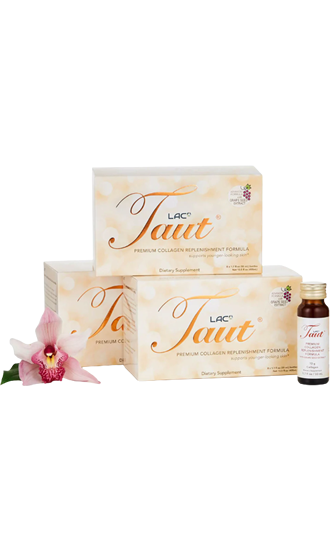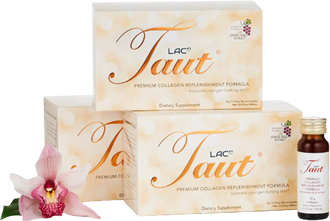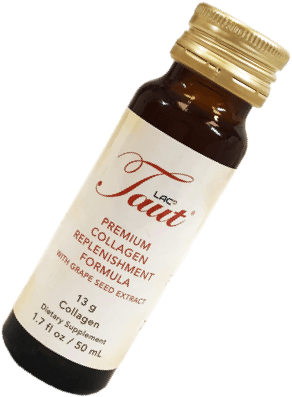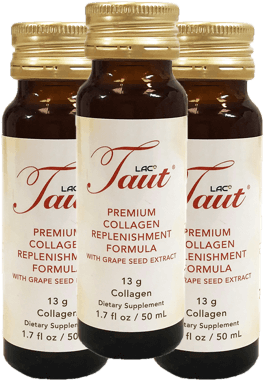What Genetic Testing Can Reveal About Your Skin

Published September 11 2019
These days, DNA testing is all the rage. It’s been around for a few years, but now it seems like everyone is taking a DNA test in order to find out more about themselves. This curiosity makes perfect sense, especially when it comes to our health. What better way to prevent potential health and beauty challenges than by knowing exactly what cards we’ve been dealt—those that have been written in our stars since birth?
DNA testing continues to evolve, and now we can even discover information about our own skin (yes, you read that right). With Genetic testing (Genomics), you can be more aware of how and why your skin ages the way that it does. You’ve surely wondered why some women seem to age more slowly than others. It’s not always because of the creams they use or treatments they've had. Or why is it some women or men can do the most minimum, eat poorly, drink and still have amazing skin?
It's so effortless for some, and yet for most of us, we have to do so much more. Turns out sometimes the answer is simply genetics.
What Can Genetic Testing Reveal About Your Skin?
Will it tell you if you'll look like Cate Blanchett in your old age? Not exactly, but it can tell you if you can age like her or if your skin is set to age faster, based on the following genetic characteristics:
1. Collagen Density and Quality
Is your skin collagen more prone to damage from environmental factors that results in more wrinkles and thinning skin?
Your skin is made up of 75% collagen, and having more collagen helps to support healthy, youthful skin. Your body produces collagen naturally, however the quality and quantity varies with age and environmental factors largely determined by your DNA. This explains why people experience different levels of skin aging.
A genetic testing report can reveal whether the collagen in your skin breaks down faster than the average rate, and also determines your skin collagen quality score.
If your skin collagen score is low or more prone to collagen damage, it is probably time to start supplementing your skin with marine collagen peptides. Here is what to look for while shopping for a good quality collagen supplement.
2. Skin Texture and Elasticity
A DNA report on your skin can reveal exactly what your skin texture is like and how elastic it is, meaning how easily it can bounce back or resist wrinkling. This is largely due to how much collagen and elastin your skin has.
As you age, your skin starts to lose the ability to maintain skin flexibility, and elasticity declines due to a group of enzymes called MMPs. Experts from HomeDNA believe MMPs can increase structural damage to the skin and create imbalances that can contribute to unstable collagen support, leading to loss of skin firmness and structure. Some of the signs associated with this category: increased collagen breakdown, sagging, jowls, folds, healing issues, and premature wrinkles.
3. Fine Lines and Wrinkles
A DNA test can reveal whether your skin is particularly sensitive to fine lines and wrinkles, moreso compared to others, based on the genetic variants identified in the MMP and STXBP5L genes, as described by Pathway Genomics.
Wrinkles are a sign of aging skin and can range in severity from thin fine lines to deep furrows in the skin. Wrinkles are caused by both intrinsic (genetics, state of health) and environmental factors, such as UV and pollution exposure, smoking, alcohol, and bad diet. These factors can cause damage to the skin cells and breakdown of collagen structures in the dermis of the skin.
Here is a sample HomeDNA Skin Report:

4. Skin Glycation Protection
You probably already know consuming too much sugar can cause inflammation that results in accelerated skin aging. However, you probably don't know the reason why. This is due to a process known as Glycation - where sugar molecules chemically bind with proteins like collagen, elastin, lipids and nucleic acids in the skin cells. This causes collagen fibers to harden and become stiff, lose elasticity and break, ultimately leading to the formation of fine lines, wrinkles, thinning and compromised skin-barrier functions.
The end products produced from glycation are referred to as 'advanced glycation end products' (AGEs), and they are expressed in accelerated skin aging and skin inflammation. AGEs can also lead to damaged skin e.g. looser, cracked and thinner skin.
The more sugar you consume, whether processed or natural, the more AGEs are produced. AGE accumulation also increases with age and UV exposure, and genetic factors can also have an effect on the AGE level.
Genetic testing will show the variants in the gene AGER and GL01, which is associated with increased AGE levels if you are prone to skin glycation.
5. Skin Photo-aging, Pigmentation & Freckles
Melanin helps protect your skin by absorbing damaging UV rays when you are exposed to the sun. However, overexposure to sunlight can also cause your skin to produce more melanin that results in darker skin. Different types of skin respond differently, which can impact the likelihood of developing sun spots or freckles. Over time, this can cause irregular skin pigmentation due to over- or under-production of melanin in the body.
Signs that the genes are prone to sun spots, freckles and hyper-pigmentation are found in the genetic variants of the MC1R and IRF4 genes.
The best defense against photo-aging is to understand individual risk factors, maintain proper nutrition and limit UV exposure. A DNA report can help you understand what you should do to deal with this issue.
6. Dry Skin and Skin Moisture Factor
Have you ever wondered why your skin is always so dry, no matter how much moisturizer you apply or how much water your drink?
Dry Skin and low moisture levels are usually caused by environmental factors such as dry, cold weather, too much sun and frequent hot bathing, which can reduce skin lipids. However, these symptoms can also occur at all ages due to this gene factor.
Filaggrin (think of it as the moisture protein) is important in maintaining the structure of the skin’s epidermis (outermost layer of your skin). Certain filaggrin gene (FLG) variants can lead to a decrease or loss of the moisture protein -- which results in dryer skin.
Dry or dehydrated skin is skin that lacks moisture, which can become rough, itchy and worse -- the appearance of small cracks that can be painful.
The DNA report will show your gene factor and how you can potentially remedy this, especially if your skin is dehydrated.
7. Skin Oxidation Protection
Antioxidation response is your body's natural ability to fight against free radical damage caused by harmful agents like ultraviolet (UV) rays, environmental pollutants, toxins and waste produced by your body. It does this by detoxifying and counteracting the free radicals with your body's naturally produced antioxidants.
Oxidative stress occurs when your antioxidation response is weakened, and is a major factor in skin aging. Oxidative stress leads to breakdown of the collagen that provides structural support to the skin. According to Pathway Genomics, these genetic variants coding for the antioxidant enzymes including SOD2, GPX1, CAT and NQO1, have been associated with an increased risk of oxidative stress-induced skin aging, or a decreased antioxidation response.
The Genetic testing report will reveal if there is decreased antioxidant activity in your skin by how much these antioxidant enzymes are present, which makes you either more susceptible to oxidation and free radical damage or not.
8. Skin Inflammation and Allergy Risk
For once you don't need to second guess whether your skin is the 'sensitive type', the tendency to react to allergens and pollutants that result in inflamed, irritated red skin.
Experts have linked these characteristics to the FLG gene. Certain FLG variants lead to a decrease or loss of the filaggrin protein, resulting in increased susceptibility to skin irritation and contact sensitization to metals such as nickel.
Filaggrin is important in maintaining and protecting the epidermis (top layer of your skin) and it is also involved in the inflammatory response - the ability to fight against foreign particles. When this ability decreases, your skin reacts with a bad reaction -- redness, irritation and inflammation.
9. Are You More Prone to Stretch Marks, Cellulite and Varicose Veins?
Yes, this is written in your genes and you should no longer feel terrible or guilty for having unsightly cellulite, varicose veins or stretch marks!
Genetic predisposition, hormone changes, gender, ethnicity, age and weight changes contribute to risks of developing cellulite. Genetic variants in the ACE and HIF1A genes analyzed in Pathway Genomics' test can demonstrate if you have a higher risk of developing cellulite.
Stretch Marks can also be identified in the ELN, SRPX, HMCN1 and TMEM18 genes analyzed in their test, which can help pregnant women to better prepare, if their gene shows higher tendency to develop stretch marks from pregnancy.
Apparently spider veins are mostly genetically inherited. Genetic variants in the MTHFR gene analyzed in the DNA test is associated with an increased risk of superficial veins. Other non-genetic factors include obesity, age, standing and walking upright for long periods and hormonal changes. Knowing if you are more prone to getting spider (varicose) veins can help you take action to prevent or reduce activities that worsen this condition.
10. What Type of Nutrients Your Skin Needs
Finally, your DNA report can advise you on what your skin needs in terms of micro-nutrients (vitamins and minerals) in order to look its best.
This is an example from Pathway Genomics' report showing the need to take more omega 3 and 6 because of genetic variant found in gene FADS1:

Benefits of Knowing Your DNA Skin Profile
1. Knowledge
There is so much we don’t know or understand about our own bodies. Often we’re completely in the dark about why things happen and why our skin looks the way it does or behaves the way it does. You might wonder, for example, why your skin is so dry or so oily, or why it seems you developed wrinkles at a young age while your friend did not. With a DNA report, you can finally have this knowledge at your disposal and determine what to do about it.
2. Personalized Treatment
Your personalized DNA skin report will give you insight into what to do to treat certain skin issues like hyper-pigmentation, collagen depletion, inflammation, allergies, dryness or oiliness, fine lines, sagging and wrinkles. Treatment can range from simply using creams, serums and lotions with certain ingredients to getting laser treatments to supplementing with skin-loving nutrients. Instead of trying every treatment under the sun, you can go directly to using the correct treatment that will give you the best results because you will know exactly what your skin needs.
Try this skin care quiz to help you find your perfect program
3. Prevention
Prevention is a huge part of skincare. Often, it is the most important step, because it is easier to prevent a problem than treat it once it has already reared its ugly head. With your knowledge of what your skin needs and why it has its particular problems, you can immediately begin preventative treatments to protect yourself.
4. Skin Nutrition Profile
With your DNA profile in hand, you will know exactly what foods you should eat to keep your skin looking radiant and glowing. You might discover that you have vitamin deficiencies, like vitamin D or A, that you need to address in order to improve the condition of your skin. You may also learn that you need to eat foods that are high in antioxidants to combat oxidative stress that cause skin cell damage and accelerates aging. Furthermore, many vitamins and minerals work together to make sure your skin health is at its peak.
5. Skincare Regimen
No more guessing games. With your DNA report educating you on what you need for your skin, you can revamp your entire skincare routine. You can finally throw out products that you never needed or that never worked and replace them with better products that can get the job done and target your particular skin issue.
Understanding Genetic Testing Companies
There are a variety of genetic testing companies on the market today. You might be familiar with Ancestry.com and 23andMe.com, but there are also specific companies that test for skin and go in-depth, giving you a plethora of knowledge especially about your skin.
Jessica Hoffman, a registered dietitian and nutritionist with Crave Health in Bellevue, WA, uses genetic testing regularly to better understand her patient's genetic health markers so she can tailor nutritional solutions that are based on each patient's specific genetic characteristics. Even though genetic testing for health is available over the counter and online now, Jessica cautions the importance of finding a reputable and qualified company to collect and analyze your data.
Here are some things to look out for when choosing a company that you can trust.
1. Reputation – First and foremost, you should check to see if the DNA testing is being done by an accredited clinical laboratory that will give you real results. You can usually determine this by looking at the testing company’s website.
2. Accuracy – An accredited laboratory will be able to give you the most accurate results that will help you learn everything there is to know about your skin.
3. Data Storage – Your genetic information is kept strictly private and confidential unless you yourself plan on sharing it onto a public forum. You retain all the rights to your content, and don’t have to worry about your information being made public by the company.
4. Trusting the Report – In addition to being accredited laboratories, many of the tests are reviewed by expert PhD's to make sure all the information is as accurate as possible and can be trusted. Many scientists and researchers also work in these labs to ensure quality.
5. Reviews – Naturally, reading reviews from satisfied or dissatisfied users can be an extra helpful step when determining which genetic testing company to use for your DNA testing. Reviews can also give you more information from users who have received their reports or followed the recommendations to make their skin look better, and whether they have had good results in doing so.
Top 3 Companies for DNA Testing for Skin
1. HomeDNA – This is a great company to use because they are an accredited clinical laboratory with over 20 years of experience in the business. They work in a fully secured facility that will keep your information private, and they also work with researchers and scientists who can evaluate your information to ensure that it is accurate. Cost is $99 for an at-home testing kit from this company.
The report is really easy to understand and it also provides recommendations broken into 3 categories: topical ingredients, supplement ingredients and professional treatments.
See sample report
2. Orig3n – Like HomeDNA, Orig3n is also an accredited laboratory that will ensure your information is kept strictly private and never leave their lab. This company also makes DNA retrieval easy by asking for a cheek swab rather than spit. A genetic report for skin costs $99.
3. Pathway – Pathway is excellent because it gives you information on multiple traits like photo-aging, collagen and elasticity, wrinkles, inflammation, skin allergy risk, skin moisture factor, risk of cellulite and even stretch marks
You can buy a SKINIQ kit from Pathway for $129. The SkinIQ report is easy to understand, and does not require you to have any medical or science background. Best of all, it also provides recommendations and preventive solutions for each skin category test results.
Personalized Vitamins & Supplements To Help Your Skin
Knowledge of the genes that contribute to skin issues and aging can help us take care of not only our health but also work to prevent aging. You can now do this with genetic testing for skin. Maybe it’s time to try genetic testing and customize your own skin care program, based on your genetic characteristics? It certainly can’t hurt!
However, what happens after you have the blueprint to your skin? What's next? Here comes the new trend -- personalized supplements -- that has worked for many women and men.
As shown in both HomeDNA and Pathway Genomics, feeding your skin with the right nutrients - vitamins, minerals, essential fats, drinkable collagen liquid, and antioxidants -- is extremely helpful in keeping your skin looking its best.
Vitamins A, C and E are especially important both to ingest and to apply topically onto your skin. Vitamin A helps maintain skin integrity, and when applied topically it accelerates cell turnover to help fight acne and signs of aging.
Collagen peptides and Vitamin C are necessary to stimulate collagen production and replenish your lost collagen in the skin, which can help keep your skin firm, tone and healthy.
Vitamin E, French Pine Bark, Grape Seed Extract, Glutathione are potent antioxidants that prevent and reverse free radical damage that can degrade collagen and accelerate aging.
With so many vitamins and supplements to consider, is there one product that includes collagen, vitamins, hyaluronic acid, and antioxidants to nourish your skin? Taut Premium Collagen Advanced Formula fits this bill and will rejuvenate your skin and give you visible results.
Each tiny 1.7oz glass bottle is formulated with high potency 13,000mg marine collagen peptides with skin loving ingredients - elastin peptides, hyaluronic acid, grape seed extract, ceramide and vitamin C that will restore your skin collagen, and firm, plum, hydrate as well as protect your skin from free radical damage. It can also help reduce hyper-pigmentation and heal scars.
Is DNA testing worth It?
With a good report, we can learn how and why our skin ages the way it does. Knowledge of the genes that contribute to aging can help us take care of not only our health but also work to prevent aging. These insights can also help us understand what our skin really needs. It certainly can't hurt!






